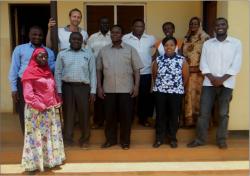Project 10: Safety
 Project Title
Project Title
| InterACT: Interactions between artemisinin-based combination treatment for malaria and antiretrovirals for HIV/AIDS in co-infected patients in Muheza, Tanzania |
Project Location(s)
| Muheza, Tanga Region, Tanzania |
Lead Principal Investigator
|
Dr. Lasse Vestergaard, University of Copenhagen Lasse Vestergaard, MD PhD, has a background in malaria, other vector-borne and infectious diseases, epidemiology and international public health. He is based at the Centre for Medical Parasitology (CMP) at the Institute of International Health, Immunology and Microbiology at University of Copenhagen, and the Department of Infectious Diseases at Copenhagen University Hospital, and is also affiliated to the Malaria Reference Laboratory at the National Institute of Infectious Diseases (SSI), Denmark. He has several years of experience from epidemiological, clinical and behavioral research projects on malaria in northern Tanzania, and has also undertaken a number of assignments on malaria control and surveillance of antimalarial drug resistance for WHO and The Global Fund. |
Other Principal Investigators
|
Dr. Martha Lemnge, Director, National Institute of Medical Research, Tanga Centre, tanga, Tanzania. Profesor Ib Bygbjerg, Department of International Health, Immunology and Microbiology, University of Copenhagen, Copenhagen, Denmark. |
Research Aim(s)
| Safety |
Project Background and Rationale
|
As HIV/AIDS continues to spread in malaria-endemic countries, an increasing number of patients will here need concomitant treatment for both infections. Effective artemisinin-based combination treatments (ACTs) are available for malaria and antiretroviral combination treatments (ARTs) for HIV/AIDS, and these treatments are presently recommended by WHO and ministries of health in many endemic countries. However, there is cause for concern, as theoretically some of these drugs may be involved in harmful interactions with each other as they share important common metabolic cytochrome enzymes. Such interactions may lead to less effective treatments and/or adverse events as a consequence of reduced or increased drug levels, respectively; however, only sparse clinical and pharmacological information is presently available to guide clinicians and policy-makers on the use of ACTs together with ARTs in patients with both HIV and malaria. The main aim of the InterACT project is to conduct a series of detailed studies of clinical safety, therapeutic efficacy and pharmacokinetic interactions between the currently recommended first-line treatment for malaria (artemether-lumefantrine) and some widely used first-line antiretroviral treatments for HIV/AIDS in Tanzania. The studies will be conducted among patients with uncomplicated malaria, who attend the HIV/AIDS Care and Treatment Clinic and Muheza Designated District Hospital in Muheza, north-eastern Tanzania, which is an area characterized by intense transmission of Plasmodium falciparum malaria and a moderate prevalence of HIV. The findings of the study is expected to inform national treatment guidelines for malaria in patients with HIV/AIDS in Tanzania, and elsewhere. |
Current Status of Project
|
InterACT is a clinical trial that examines the influence of first-line antiretrovirals on the therapeutic efficacy, safety and pharmacokinetics of artemether-lumefantrine for malaria in adult HIV patients in north-eastern Tanzania. Patient enrollment started in July 2009 and is progressing well. |

